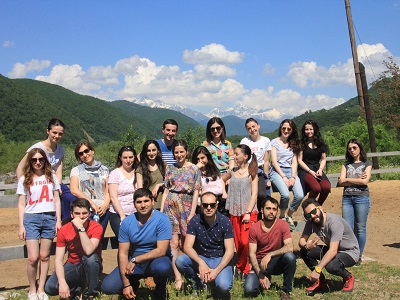'Racha, my love'
- Details

“Education is the biggest value for farmers.”
With these words, Zaza Keresidze, ENPARD's coordinator (from People in Need – PIN) in the region of Racha, Georgia welcomed ISET graduate students during a field trip organized by the Agricultural Policy Research Center (APRC) of the ISET Policy Institute.
The two-day field trip to Racha (a highland area in western Georgia, located in the upper Rioni river valley and hemmed in by the Greater Caucasus mountains), included visits to Blauenstein Georgia and the Natural Products of Racha agricultural cooperative, during which local representatives of the farm and cooperative introduced ISET students to the current operations, capacities, and highlights of their respective enterprises.
The students first visited Blauenstein Georgia, which is composed of a local farm complex in Racha, a meat processing plant, and the Blauenstein Brand shop in Tbilisi. The company’s local representatives conducted a small tour which started in the slaughterhouse and continued on to the farm.
Role of IMF in sustaining global economic development and IMF cooperation with Georgia
- Details

On June 7, during his visit to Georgia, Mr. Anthony De Lannoy, the Executive Director of the IMF who represents Georgia along with the other 15 countries at the IMF Board of Directors, addressed an audience of ISET researchers, students and management, as well as senior representatives of the National Bank of Georgia, with an overview of the IMF and its cooperation with Georgia.
Mr. De Lannoy spoke of the IMF as an institution, and described its history, structure, functions, instruments and its evolution.
He further explained that the IMF’s activities include surveillance, in which the IMF acts as a global monitor over the economic, financial and exchange rate policies of its members, and a catalyst of the countries’ economic development; it provides to capacity development by providing technical cooperation support and contributes to policy analysis of various beneficiaries; and it extends lending, which is realized in its own currency Special Drawing Rights or SDR, which is the IMF’s own currency with 1 SDR being an equivalent of ca. 1.36$, through a range of financial concessional and non-concessional instruments, such as “precautionary and liquidity credit lines”, “extended fund facilities”, “standby arrangements’, “rapid credit facilities” and others, depending on the needs of the IMF members in covering their payment imbalance and their quota at the Fund (i.e. the members’ voting rights and access to funding relative to the amount of their contribution and their economic standing).










